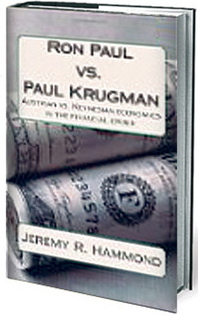 Gene Epstein reviews for the latest Barron’s a new book that examines the recent financial crisis from contrasting economic perspectives — Austrian and Keynesian.
Gene Epstein reviews for the latest Barron’s a new book that examines the recent financial crisis from contrasting economic perspectives — Austrian and Keynesian.
Jeremy Hammond, a political journalist self-taught in economics and a writer of rare skill, has produced such a book. Hammond had the ingenious idea of contrasting the Austrian, free-market school of economics with the Keynesian, pro-government school on the recent financial crisis through a close examination of the words of two commentators: former Congressman Ron Paul, schooled in the Austrian perspective, versus the Nobel Prize–winning Keynesian and New York Times columnist Paul Krugman.
You might think a mere politician would be no match for a Nobel laureate, but in this case, think again. As forecaster, diagnostician, and prescriber, Ron Paul offers rich insights, while Krugman, true to his Keynesian perspective, gets things wrong at virtually every turn.
The Austrian school, associated with economists who came from Vienna, including Ludwig von Mises and the Nobel Prize–winner F.A. Hayek, has been thoroughly absorbed by Ron Paul. Those familiar with the writings of John Maynard Keynes can also attest that Krugman stays true to the Keynesian tradition. Keynes, for example, declared in his magnum opus, The General Theory of Employment, Interest, and Money, that the “remedy” for economic booms “is not a higher rate of interest but a lower rate of interest,” an insight that would leave you ill-equipped to deal with the housing boom spurred by low interest rates that eventually led to a bust.
But there is one special quality that Krugman brings to his commentary: a deep-seated streak of dishonesty, hilariously and mercilessly exposed by Hammond whenever it comes up, which it often does. For example, there is the memorable episode in which the New York Times columnist keeps trying to deny, and then cover up, the fact that he had frequently and vigorously advocated a Federal Reserve–induced housing bubble. As Hammond wryly observes, perhaps the Nobel laureate did not know the meaning of the verb advocate. And lest anyone think the author quotes Krugman out of context, it should at least be noted that he quotes him copiously, letting him hang himself in the process, and then deftly tightening the noose through pointed reminders of what we have just read.


